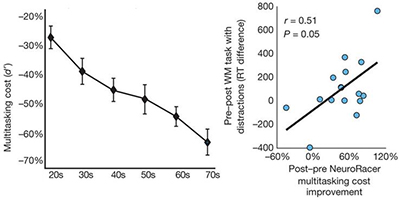
The NVIDIA GPU Technology Conference 2014 keynote, “Video Games and the Future of Cognitive Enhancement” by Dr. Adam Gazzaley, an Associate Professor at the University of California, San Francisco, addressed the goal of improving quality of life as people age.Scientists, through their research have found that playing video games improves user’s mental speed and agility in real life. At the 2014 GTC conference, Dr. Gazzaley also mentioned that the NeuroRacer video game has been submitted for U.S. Food and Drug Administration (FDA) approval.
To keep players interested, the NeuroRacer game adapts to keep a player in what is described as a “flow state” where the game is easy enough so the player feels entertained and interested, but not so difficult as to frustrate the player so they quit. As the player gets better with practice, so does the game become progressively more difficult.
Dr. Gazzaley notes that multitasking performance declines starting in around age 20, as can be seen in the graph on the left of Figure 1. Multitasking performance improved by as much as 120 percent, as can be seen in the graph on the right, after playing a prescribed regime of NeuroRacer.
The benefits go far beyond an improved ability to play a video game. Researchers also found that the NeuroRacer-trained volunteers fared better in tests of two other cognitive skills that involve similar areas in the brain to multitasking, but which weren’t directly exercised by NeuroRacer. The volunteers got better at responding to infrequent important stimuli (like a lifeguard or grandparent, who has to watch kids play for hours without getting bored and missing the rare kid in trouble). Volunteers also improved their working memory, which holds information for brief periods of time.
Dr. Gazzaley’s results are similar results to an earlier study on a video game called “Road Tour” (since renamed “Double Decision”) by Posit Science. In this earlier test, researchers from the University of Iowa tested 681 healthy adults over age 50 who were assigned to play either the video game or complete cross word puzzles. Scientists found that those who played a “Road Tour” video game for at least 10 hours — which required them to identify “vehicles” among an ever-faster array — gained at least three years of cognitive (mental skill) improvement after one year. A group that received four additional hours of training with the game improved their thinking abilities by four years.
Compared with the crossword group, the Road Tour gamers scored higher on tests of concentration, and were able to switch between different tasks and process new information more quickly — abilities that could help older adults with everyday skills, including driving and avoiding accidents, researchers wrote.
The decision to pursue FDA approval is a shrewd business move, as it would add credibility to the notion of playing a video game to improve cognition — a connection that is difficult for consumers to make purely via scientific studies.









